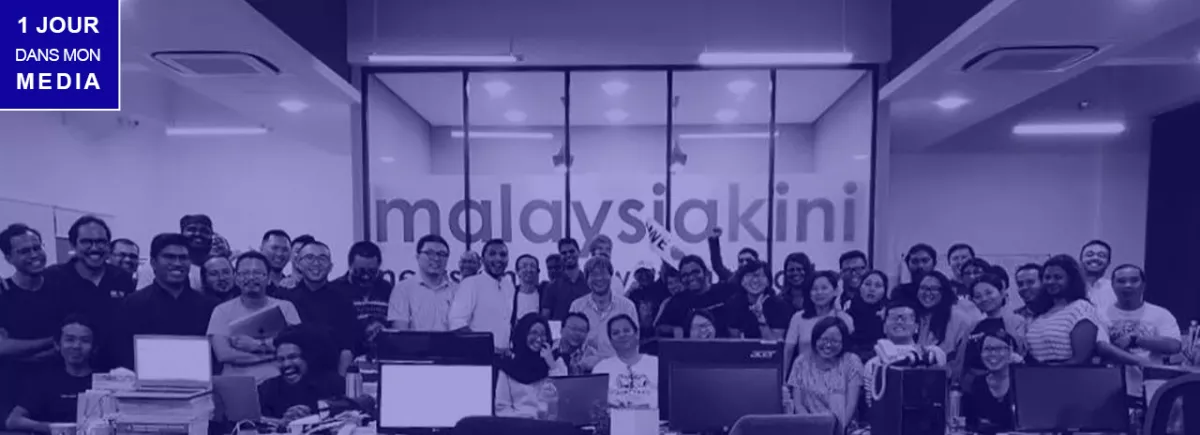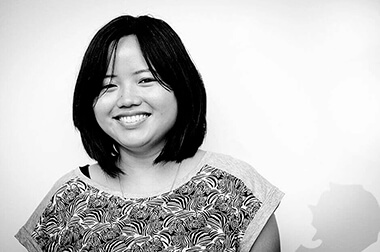
Malaysiakini: first independent media outlet in Malaysia
Related project
4M AsiaOne day in my media organisation is a series of weekly reports illustrating the daily lives of people who work in media organisations across Africa, the Arab world and Southeast Asia, supported by CFI.
This week, we have an interview with Aun Qi Koh, sub-editor of the news website
Malaysiakini.com.
Aun Qi Koh is a young Malaysian aged 27.
After completing a degree in government and international relations at the University of Sydney in Australia, she worked as an intern in several media groups. She was recruited in 2017 by Malaysiakini, where she currently works as a sub-editor.
A pioneering media outlet
It was created in 1999 after the then Prime Minister of Malaysia, Dr Mahathir Mohamad, promised the Internet wouldn't be censored.Malaysiakini is the first independent news outlet the country has ever seen.
With an editorial policy focused on politics, this online media outlet's main target audience are Malaysians aged 50 and over. However, many efforts are being made to attract young people and get them interested in political affairs. The website is available in 4 languages: English, Malay, Chinese and Tamil. Aun Qui ensures information is checked and corrects the spelling and grammatical errors that can sometimes find their way into articles.
"I'm also partial to data journalism and I'm involved in creating the website's infographics", she explains. A section entitled Kini TV dedicated exclusively to videos has also been set up. Steven Gan and Premesh Chandran, the two founders of Malaysiakini, hold the positions of Editor-in-Chief and CEO respectively.
Malaysiakini employs around 90 staff, including 58 people in the editorial team and around thirty in operations. In 2014, the outlet acquired a building in Petaling Jaya in the state of Selangor, which became its official head office.
Digital technology: a vehicle for media plurality
Aun Qi notes that the majority of the country's news outlets are owned or controlled by the government. Hence the drive to diversify the media landscape: "LOnline media are a means of breaking the state's monopoly on newspapers in Malaysia. A news website is also more economical than a print newspaper", she argues.

Indeed,
Malaysiakini is very active on social networking platforms: "Malaysia has one of the highest rates of social media use in Southeast Asia. 70% to 80 % of our audience consult us via Facebook", she notes.
Facebook and Twitter are mainly used to publish articles and communicate with readers through photos, infographics, surveys or videos.
According to the
Digital News Report 2017 produced by the University of Oxford's Reuters Institute for the Study of Journalism, Malaysians mainly consult news on social networking sites and messaging applications: “It was important for us to be present on these new channels", the sub-editor believes.
The website is partly subscription-based: the English and Chinese versions require a paid subscription while the Malay and Tamil versions are free. The metered paywall provides readers with access to ten articles a month for free. Subscriptions and advertising account for 60% of the outlet's revenue, with the rest of its income coming from Google Ad Exchange.
Before they start working on a story, journalists are required to inform the editor-in-chief of their chosen angle. They are encouraged to record every interview in audio format to ensure they have backup in case politicians claim their words have been misrepresented. The sub-editors are also responsible for ensuring articles contain no defamatory content that might lead to legal proceedings: "We also offer a right of reply to people who are the target of allegations", inotes Aun Qi Koh.
The government's outdated view of the media
According to the young woman, the role of the media as the “fourth power" is a foreign concept to the state: "The government sees the media as a tool for promoting and broadcasting its policies. There seems to be a fundamental mismatch between how the political authorities view the duty of the press and how we see it".
Media organisations are seen as exercising severe self-censorship, on top of the censorship established by the government: "Press freedom is hindered by a series of laws, and in particular by the anti-fake news law adopted recently by Parliament. Racial and religious issues need to be handled with caution to avoid breaking the law on sedition", the young woman claims.
Malaysiakini in particular has been accused of being a tool for the opposition - a view that endures and which the outlet is constantly having to deny. For example, its journalists have been banned from attending certain government events and, on some occasions, have been asked to vacate the premises - "which makes our duty to inform a lot of more difficult to perform", Aun Qi believes.
Malaysia is ranked 144th out of 180 countries in the 2017 World Press Freedom Index. One of the consequences of this situation is the increasingly low level of trust of Malaysians in their news outlets.

Malaysiakini has contributed to enriching Malaysians'news sources, in particular by offering an alternative take on current affairs:
We intend to defend press freedom by showing the need for a critical perspective on the actions of government.
In the long term, Malaysiakini hopes to make its business model - and, therefore, its presence in the region's media landscape - viable.


